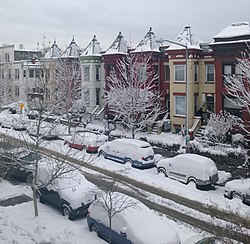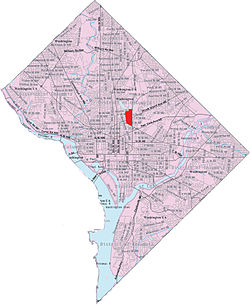Bloomingdale, Washington, DC
| Bloomingdale, Washington, D.C. | |
|---|---|
| Neighborhood of Washington, D.C. | |

Victorian-style rowhouses in Bloomingdale.
|
|
 Bloomingdale in the District of Columbia |
|
| Country | United States |
| District | Washington, D.C. |
| Ward | Ward 5 |
| Advisory Neighborhood Commission | ANC 5E |
| Government | |
| • Councilmember | Kenyan McDuffie (Ward 5) |
| Area | |
| • Total | 0.20 sq mi (0.5 km2) |
| Population (2010) | |
| • Total | 4,980 |
| • Density | 24,510.0/sq mi (9,463.4/km2) |
| ZIP Code | 20001 |
| Area code(s) | 202 |
| Website | http://bloomingdaleneighborhood.blogspot.com/ |
Bloomingdale is a neighborhood in the Northwest quadrant of Washington, D.C., less than two miles (3 km) north of the United States Capitol building. It is a primarily residential neighborhood, with a small commercial center near the intersection of Rhode Island Avenue and First Street, NW featuring bars, restaurants, and food markets.
Most of Bloomingdale's houses are Victorian-style rowhouses built around 1900 as single-family homes. Today, they remain primarily single-family residences, with some recently converted to two-unit condominiums.
Bloomingdale is bounded to the north by Channing St., N.W., to the east by North Capitol St., to the south by Florida Ave., N.W., and to the west by Second St., N.W. The neighborhoods bordering Bloomingdale are LeDroit Park to the west, Shaw to the southwest, Truxton Circle to the south, Eckington to the east, and Stronghold to the northeast. To the north, sit the McMillan Sand Filtration Site and the McMillan Reservoir.
The neighborhood is a low-lying area, at the foot of hills that extend to the north and east. Its topography is also shaped by the now-buried Tiber Creek, one branch of which generally followed what is now Flagler Place NW.
Because of its low-lying topography, flooding periodically occurred in parts of the neighborhood during particularly strong rainstorms. In July 2012, the stormwater drainage system was overwhelmed three times by particularly strong storms, flooding vehicles near the topographic basin at T Street NW and Rhode Island Avenue NW and causing sewer backflow to enter some basements, many of which were rental apartments. Since then, DC Water has undertaken a large-scale tunneling project designed to divert and contain stormwater.
...
Wikipedia
